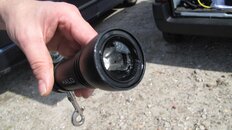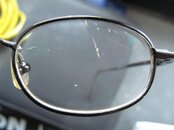Divers,
This message is to inform you of a potentially serious flaw with the HALO dive light (linkage to random website selling this product), which is marketed in the EU by Beaver sports.
If this light floods then it can literally explode. This is not a joke.
Attached to this post are three pictures. The first one shows the lamp after flooding and then subsequently and without warning exploding during inspection once on the surface. Notice that the glass has been blown out.
The glass front of the light exploded with such force that there was literally nothing left of it. The diver, who is a friend of mine, was fortunately wearing glasses or he would have received a serious injury to his eyes from the blast. (picture #2 shows the damage to his glasses).
The third picture was taken after all of the shards of glass had been removed from his face. All of those wounds are a direct result of the exploding dive light. Furthermore, what cannot be seen from the pictures is that the explosion was so violent that it left his ears ringing for 45 minutes after the incident.
In early September Beaver sports was contacted about this incident but after two months of no meaningful communication we must assume that they are not taking this problem seriously and have therefore decided to warn divers ourselves. These lights are still on the market and although Beaver said the OEM has been informed (we have no proof of this apart from their word) no action has been taken by the OEM either to the best of my knowledge.
I have no no agenda here aside from doing my part to help avoid similar accidents by other divers. My advice therefore is this: DO NOT BUY AND DO NOT USE THESE DIVE LIGHTS until a proper recall has been made to remedy the explosion hazard.
R..
This message is to inform you of a potentially serious flaw with the HALO dive light (linkage to random website selling this product), which is marketed in the EU by Beaver sports.
If this light floods then it can literally explode. This is not a joke.
Attached to this post are three pictures. The first one shows the lamp after flooding and then subsequently and without warning exploding during inspection once on the surface. Notice that the glass has been blown out.
The glass front of the light exploded with such force that there was literally nothing left of it. The diver, who is a friend of mine, was fortunately wearing glasses or he would have received a serious injury to his eyes from the blast. (picture #2 shows the damage to his glasses).
The third picture was taken after all of the shards of glass had been removed from his face. All of those wounds are a direct result of the exploding dive light. Furthermore, what cannot be seen from the pictures is that the explosion was so violent that it left his ears ringing for 45 minutes after the incident.
In early September Beaver sports was contacted about this incident but after two months of no meaningful communication we must assume that they are not taking this problem seriously and have therefore decided to warn divers ourselves. These lights are still on the market and although Beaver said the OEM has been informed (we have no proof of this apart from their word) no action has been taken by the OEM either to the best of my knowledge.
I have no no agenda here aside from doing my part to help avoid similar accidents by other divers. My advice therefore is this: DO NOT BUY AND DO NOT USE THESE DIVE LIGHTS until a proper recall has been made to remedy the explosion hazard.
R..








